Poems of Home: Two Israeli Poets
On the "nightmare of biography" and the dream of the "soul's calm".
My broken heart is with Israel—where more than 1200 people were slaughtered by Hamas in the worst single-day murder of Jews since the Holocaust. I am horrified by the burning, choking, and beheading of babies, children, women, and men. Many Jewish communities held a communal fast in response yesterday. I think many of us struggle to respond. And many of us worry about the responses to come.
We are fasting in our hearts.
In all honesty, it’s also hard to write anything right now. I want to offer poems from Israel, about home and birthplace, along with terror and peace.
“I will still rise from the nightmare of biography,” the wonderful poet and novelist Shimon Adaf, who grew up in Sderot, where seven people were gunned down at a bus stop this past Shabbat, wrote in his first poetry collection long ago.
I found myself returning to that poem, now.
Shimon Adaf—poet, novelist, and rock guitarist.
I translated this poem, titled “Ending,” when I was a graduate student at The University of Iowa, and when Shimon was a visiting writer in the International Writing Program (IWP). It appeared in The Iowa Review in 2004. I can’t find the original Hebrew right now, though I am sure the book is somewhere in my library!
“Ending” was in Shimon’s first collection of poetry; something beautiful about it is that the book of Jeremiah rumbles beneath many of the poems, which is one of the book’s many pleasures. There is a distinct music in all of Shimon’s work, and when I read it, I often think of how he is the only poet-novelist-rock guitarist I know.
I am far from Shimon’s only fan. “Shimon Adaf's voice is one of the most interesting and original in contemporary Israeli literature... a rich, fascinating imagination,” Amos Oz said. I think Oz was right.
One thing to know about this poem is that Tammuz is a month in the Jewish calendar. And another thing, that many already know from the newspapers, and something that was as true in 2004 as it is now, is that Sderot has been the target of many, many attacks over the years. I am sharing it because, in conversations this week, I felt that for many people this week was a form of ending.
The poem is available through The Iowa Review, and can be downloaded as a free PDF: https://pubs.lib.uiowa.edu/iowareview/article/id/19732/
For further reading: Shimon’s heartbreaking collection Aviva-Lo in Hebrew, and Aviva-No in English, about his beloved sister Aviva, is available from Alice James Books. Yael Segalovitz is the translator. https://www.alicejamesbooks.org/bookstore/aviva-no
Shimon Adaf has written three collections of poetry and eight books of prose. Many are available in English translation and in multiple other languages.
A Poem of Home
I also found myself returning to a very short poem by Yudit Shahar, who often writes about economic and social justice. The modest little house described—or rather, imagined—in Yudit’s poem “House” reminded me of those little houses in the kibbutzim where so many were slain.
The cover of Yudit’s first book, “It’s Me Speaking,” which was a bestseller in Israel.
The title of the poem is “Bayit”—which in Hebrew is a house and also a home. Bayit also means “stanza”. In conversations with friends this week, so many mentioned a feeling of a loss of home; a loss of safety.
Here is “Bayit” in Hebrew, small as the house it describes. My translation follows.
When this translation was published in The Catamaran Review, a gorgeous journal I encourage you to support, it was paired with Orange Garden by Diane Pieri. Catamaran features poetry along with art.
Pieri’s piece uses many materials, and there is a texture and layering to Orange Garden, which reminds me both of our personal gardens and homes. (Gouache, Flashe paint, casein, gold leaf, and decorative papers, printing blocks, inks, punches on Japanese Lotka and BFK Rives papers. 48 x 80 inches. )
I love this pairing.
Orange Garden by Diane Pieri
Yudit and I have had many conversations about the direction of Israel, about politics, about the state of the world. I think you can sense her thoughtfulness in this photograph.
Poet Yudit Shahar.
I also want to acknowledge that words seem inadequate this week. I wondered if there was any point in commenting on word choice at a time like this. As some readers know, I write a column on language for The Forward, and this week I looked into the varying ways Hamas is described—”militants,” “fighters,” “terrorists,” and more, and why the word choice matters.
I found that there is an interesting divide in language used by heads of state and rabbis, and that used by journalists. It’s worth asking—is there a morality to language? You can read the piece here: https://forward.com/culture/564549/should-hamas-attackers-be-called-terrorists-militants-gunmen-israel-gaza/
I hope we can all rise above the “nightmare of biography.” I send everyone strength. Shabbat shalom!
*********************************************************************************************************
Hope you enjoyed this newsletter! Thank you for your support of writing with depth.




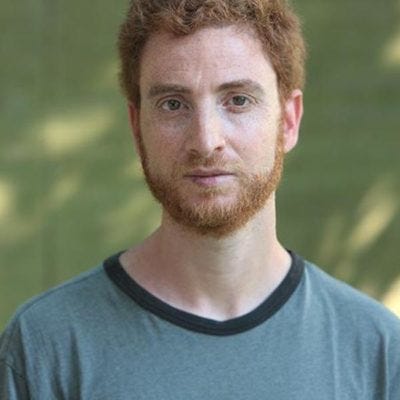
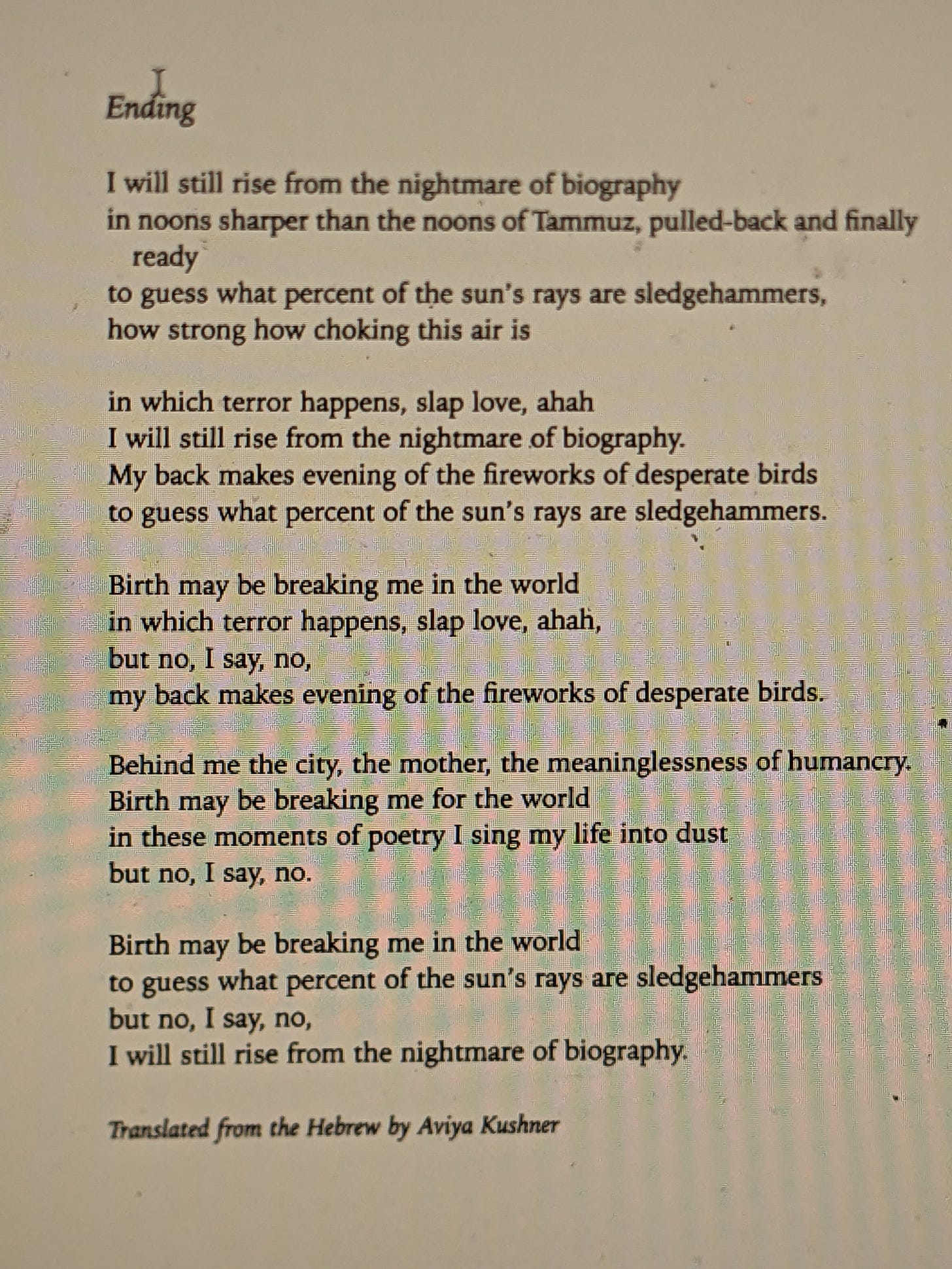
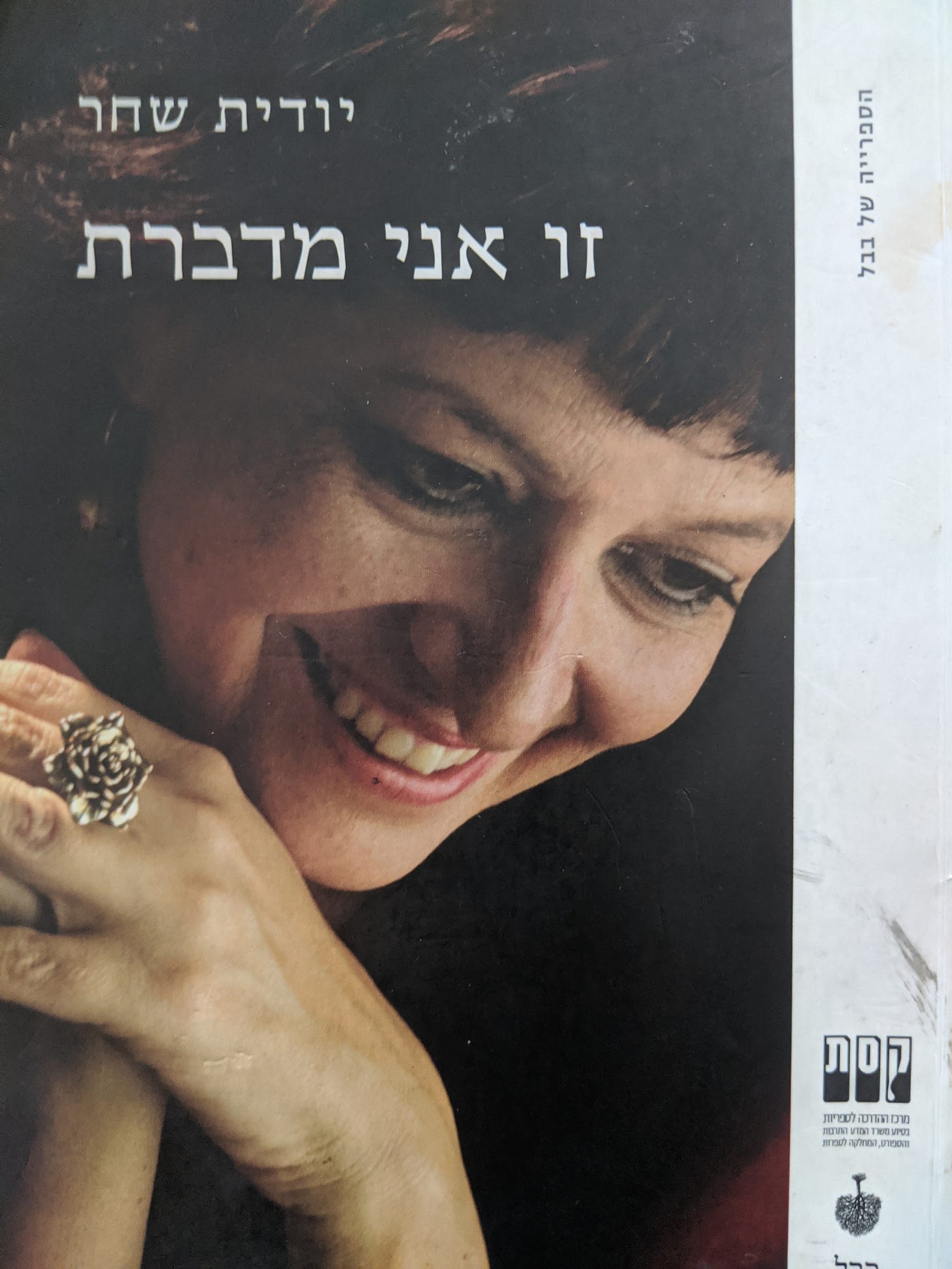


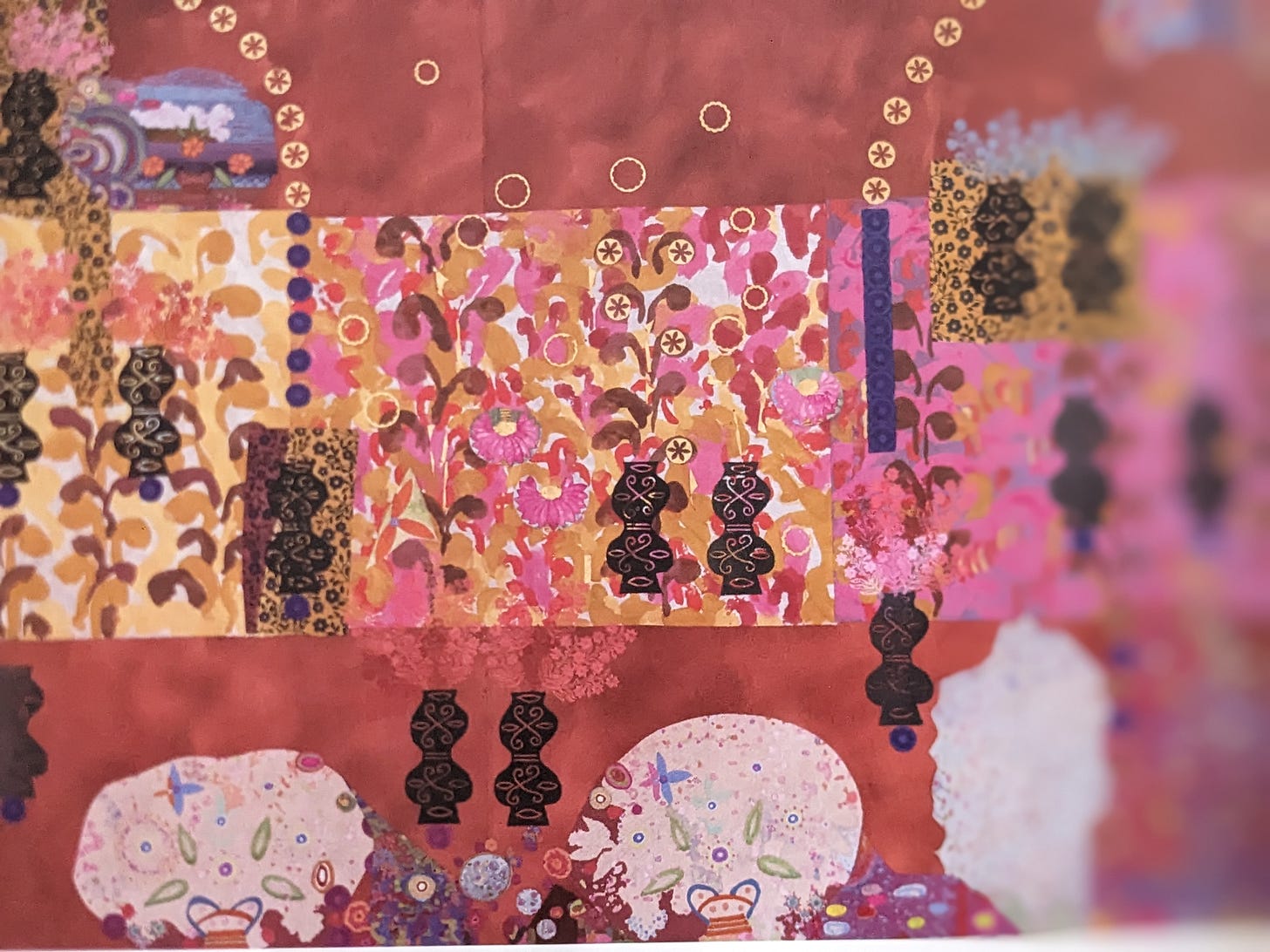
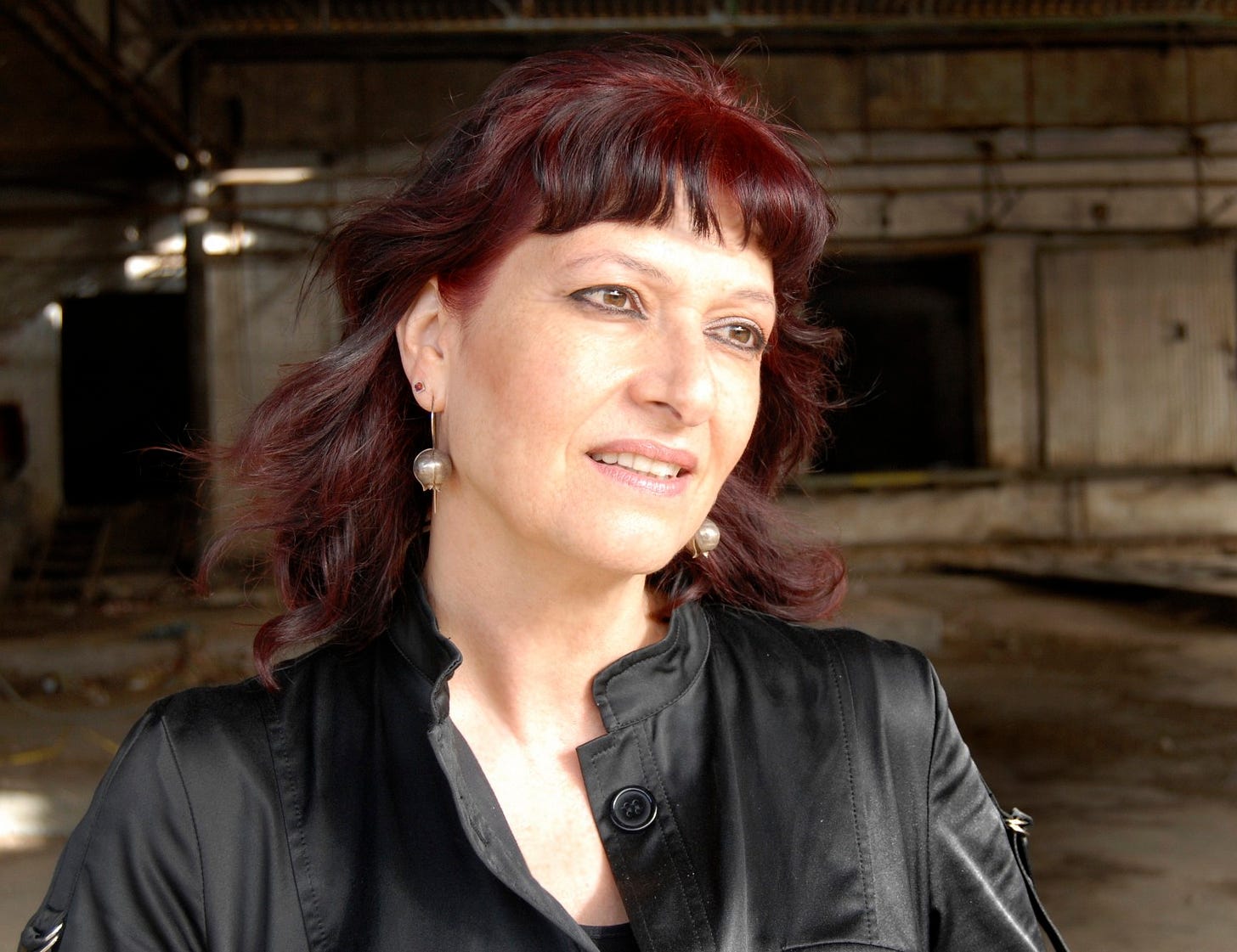
Thank you for these beautiful words, Aviya. Aside from Aviva-No and your translation here, do you know of any other translations of Adaf's poems into English?
“I hope we can all rise above the “‘nightmare of biography.’”--ken y’hee ratzon! May it be so!
Shabbat shalom to you too 💜